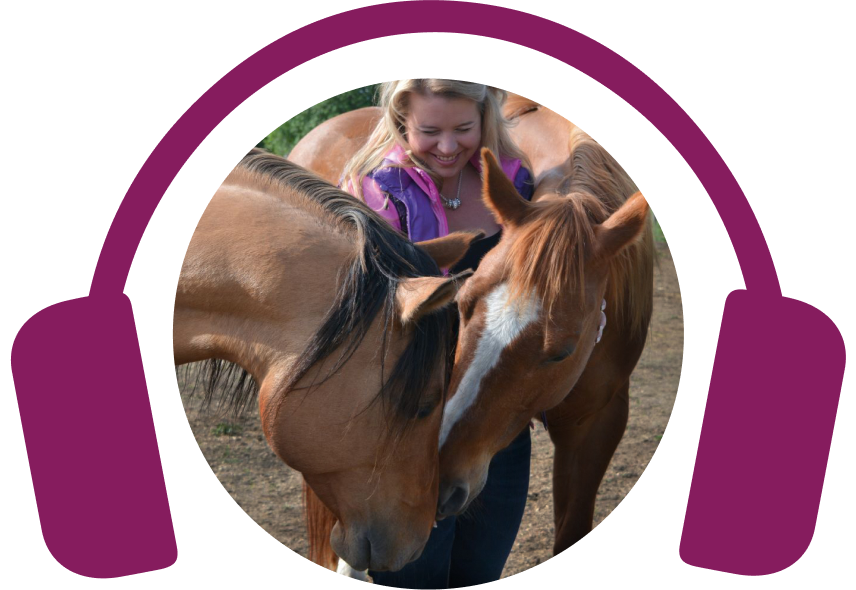Elisha’s Podcast
ELISHA’S PODCAST

Ready to get your horses on the path to better health?
This podcast was created to do just that.
Tune in to get new insights, perspectives, horse health tips, and real-life horse healing stories.
Take what you learn and apply it to your horse TODAY.

One Conversation at a time
From learning what to feed your horse and how to use nutrition effectively, to practicing prevention and approaching specific health challenges naturally, to just bringing your horse more joy and better health…
I’ve got you covered!

Check out my recent episodes
This week, we’re tackling a question horse owners often ask, which is why their horses eat dirt. Some horses only lick or nibble dirt occasionally, while others take it to extremes, even digging holes in their paddocks. The term for this behavior is geophagia, or pica, which in humans means eating things with little or no nutritional value. In horses, that behavior always points to an underlying cause that owners must explore. Why Horses Eat Dirt Horses that eat dirt are not just engaging in random behavior. They are seeking to soothe discomfort or fulfill a nutritional or emotional need. The causes often relate to mineral deficiencies, digestive issues, or stress and boredom. Identifying the reason involves careful observation and systematic elimination of possibilities. Nutritional Deficiencies When domestic horses eat dirt, it often signals unmet mineral needs, particularly sodium or selenium. Even horses on synthetic multi-mineral mixes may not be absorbing nutrients effectively, especially if their digestion is compromised or the mineral forms lack bioavailability. Improving Mineral Intake Offer free-choice salt, ensuring it’s free from unnecessary additives. Experiment with different salts for 10 days, adding 1–2 teaspoons to a mash if needed. Selenium deficiency is common. You can use organic selenium (selenomethionine) to correct it, even pairing mineral supplements with plant-based sources for better absorption. Products like Riva’s Remedies Happy Horse or Happy Horse Senior provide natural, bioavailable minerals and added herbs for cognitive support in older horses. Digestive Health When horses are getting adequate nutrition, eating dirt may stem from digestive discomfort or ulcer-related pain. Horses may also be searching for probiotics from soil or manure. Support their digestion with a high-quality probiotic, and notice whether the behavior occurs before or after meals, during stress, or when the stomach is empty. Lifestyle and Environment Horses in dry lots or dirt pens often experience boredom, stress, and periods of fasting between meals. Empty stomachs continually produce acid, which can irritate the stomach lining and lead to ulcers. Providing slow-feeder hay nets, extra hay feedings, turnout time, and social interaction can reduce stress-related behaviors. Ensure your horse has companionship and mental stimulation, as isolation and lack of forage contribute to habits like dirt eating. Eating Manure Dirt eating can also signal a lack of fiber or probiotics. Horses on lush pasture may need added fiber sources like beet pulp or timothy cubes to support hindgut health. You can give horses a human probiotic with 50 billion CFUs daily to help restore their microbial balance and reduce manure eating. Balancing Behavior and Biology Occasional dirt licking is normal. That behavior typically disappears once the nutritional and emotional needs of the horse are satisfied. Owners only need to be concerned when dirt eating becomes excessive or destructive.. Each horse is different, so resolving the issue requires observation, experimentation, and patience. Do you know what exactly is in your horse's supplements, and what they're actually doing for their health? Keeping your horse's diet and supplement program clean is one of the most beneficial things you can do for them. There is nothing that turns a horse's health around faster than cleaning up their diet and supporting their health from the inside out. The good news is I'm going live on Saturday, December 6, 2025, at 10 am Mountain Standard Time, and I invite you to join me for my first-ever two-hour workshop called Detox Done Right: How To Reduce Your Horse's Toxic Load and Upgrade Their Health. For just $127 Canadian, you will get my hands on my label-reading playbook and my clean feed roadmap- and we will finish with a 30-minute Q&A to help turn your supplement confusion into clarity. If you care about your horse's health and want real, practical steps that lead to results, then this workshop is just for you! Save your seat by clicking on the link in the show notes, or head over to my website. No need to worry if you register and miss it because I will have a recording waiting for you, whenever you are ready- but I do hope to see you all there, live! Links and resources: Connect with Elisha Edwards on her website Join my email list to be notified about new podcast releases and upcoming webinars. Free Webinar Masterclass: Four Steps to Solving Equine Metabolic Syndrome Naturally Register for my self-paced course, Resolving Equine Metabolic Syndrome Naturally. With winter just around the corner, I decided to offer some tips today, for preparing mash in the colder months. Stay tuned for practical tips to make soaking and preparing mash far easier- not only in winter, but throughout the year. Keep Mash Prep Simple Keep mash prep simple by using single, whole ingredients rather than mixed commercial feeds full of synthetics and fillers. This approach supports recovery and makes year-round feeding easier. Soaking Cubes and Beet Pulp Always soak cubes or alfalfa to prevent choking and improve digestibility. Use warm water to soften them, and soak overnight when possible. It is also essential to expand the beet pulp and pellets by allowing them to soak overnight. Preventing Mold and Spoilage Beet pulp molds easily in warm barns, so never leave it for more than a day. Store soaked mash in a cool, dry spot to keep it fresh. Adding Dry Ingredients at Feeding Time Keep dry ingredients separate until feeding. Mix the soaked portion first, then add dry ingredients right before serving to maintain freshness and nutrient quality. Preparing in Advance For convenience, prepare ziplock bags with a month’s worth of pre-measured dry mixes. Label each bag and then add it to the soaked mash when ready to feed. Handling Oils and Apple Cider Vinegar Add oil and apple cider vinegar at feeding time, and not in advance. Oils can go rancid if left open or exposed to heat, and vinegar is most effective when added just before feeding. It supports digestion and metabolic function and can even be offered in water if horses like the taste. When Soaking Isn’t Practical If soaking is impractical, use dry ingredients like alfalfa pellets or bran and moisten them slightly before feeding to make the meal more palatable. Simplifying for Helpers or Travel If you need to go away and have someone else feeding your horse, you can simplify things by providing pre-packed dry mixes. Short breaks or simplified routines will not undo your horse’s progress, and you can resume full feeding once you return. Consistency Over Perfection If you can only prepare mash three times a week, it is still worthwhile. Consistency matters more than perfection, and horses benefit even from partial improvement. Do you know what exactly is in your horse's supplements, and what they're actually doing for their health? Keeping your horse's diet and supplement program clean is one of the most beneficial things you can do for them. There is nothing that turns a horse's health around faster than cleaning up their diet and supporting their health from the inside out. The good news is I'm going live on Saturday, December 6, 2025, at 10 am Mountain Standard Time, and I invite you to join me for my first-ever two-hour workshop called Detox Done Right: How To Reduce Your Horse's Toxic Load and Upgrade Their Health. For just $127 Canadian, you will get my hands on my label-reading playbook and my clean feed roadmap- and we will finish with a 30-minute Q&A to help turn your supplement confusion into clarity. If you care about your horse's health and want real, practical steps that lead to results, then this workshop is just for you! Save your seat by clicking on the link in the show notes, or head over to my website. No need to worry if you register and miss it because I will have a recording waiting for you, whenever you are ready- but I do hope to see you all there, live! Links and resources: Connect with Elisha Edwards on her website Join my email list to be notified about new podcast releases and upcoming webinars. Free Webinar Masterclass: Four Steps to Solving Equine Metabolic Syndrome Naturally Register for my self-paced course, Resolving Equine Metabolic Syndrome Naturally. Today, we are exploring how our mindset can influence the decisions we make about challenges to our horses’ health. Whether you are dealing with a common issue or a new diagnosis that feels overwhelming, it is essential to stay grounded in practical knowledge and clear reasoning rather than emotion because disease labels can sometimes influence our perspective and choices in ways that do not serve the best interests of the horse. What Disease Labels Really Mean Disease labels are clinical tools that help classify health problems in horses, based on their blood tests, symptoms, and behavior. They can provide a framework for understanding what is happening in the body and guide the appropriate care. Some diagnoses, such as insulin resistance, are straightforward, while others may not be quite as clear. The key is to know whether a diagnosis will guide your next step or limit your perspective. When Diagnosis is Useful When progress has stalled or the symptoms fail to add up, a well-defined diagnosis will clarify what you are dealing with. Knowing the specific problem will allow you to tailor your support holistically, through diet, nutrition, stress management, and other natural approaches. The Power of Belief and Fear Disease labels can shape an owner's mindset, often leading to fear-based decisions. When a horse receives a diagnosis, the label can carry emotional weight, narrowing all that the owner may believe is possible. That fear may prevent a deeper exploration of other options, which could influence the horse’s energy and its recovery. The Laminitis Example Beliefs about laminitis have evolved drastically. Years ago, pads and shoes were considered the only option for comfort. Today, however, many horses recover with patience, proper hoof care, and the right nutrition. Unfortunately, outdated beliefs still cause many owners to give up on their horses prematurely, leading to unnecessary suffering or euthanasia. The Cushing’s (PPID) Example PPID is another condition that evokes fear. While some horses may require lifelong medication, others can improve naturally through holistic management. High ACTH results do not always mean a permanently broken pituitary. Each case is unique, so it is essential to avoid assuming the worst before exploring all options. How Beliefs Shape Outcomes What an owner believes about their horse’s condition will directly influence its healing. Negative expectations can impair recovery, while confidence and calm leadership encourage it. Horses mirror the emotions of their owners, so if you believe your horse can heal, you create the space for that healing to happen. Emotional Leadership Your emotional state guides your horse. If you stay grounded, hopeful, and consistent, your horse will feel safer and more able to recover. That mindset will also protect you from burnout by replacing your anxiety and grief with trust. Managing Financial Fear Avoid letting your financial fears drive your decisions before fully understanding what is truly needed. Financial pressure often amplifies the stress of a diagnosis, so owners may assume they will be liable for massive costs before exploring all options. Yet many horses recover with far less expense and intervention than expected. Old Beliefs Many beliefs about equine health stem from decades-old assumptions or limited studies. Always question the source of your information. Was it from a solid, well-designed study, or just anecdotal experience? Our modern understanding continues to evolve, and open-mindedness can make all the difference between despair and recovery. Health and Recovery Gray Areas Equine health often lies in the gray areas, and recovery could involve setbacks, surprises, and even miracles. Keeping an open mind, researching, and maintaining a balanced mindset can transform the outcome for your horse, while also allowing you peace of mind. Do you know what exactly is in your horse's supplements, and what they're actually doing for their health? Keeping your horse's diet and supplement program clean is one of the most beneficial things you can do for them. There is nothing that turns a horse's health around faster than cleaning up their diet and supporting their health from the inside out. The good news is I'm going live on Saturday, December 6, 2025, at 10 am Mountain Standard Time, and I invite you to join me for my first-ever two-hour workshop called Detox Done Right: How To Reduce Your Horse's Toxic Load and Upgrade Their Health. For just $127 Canadian, you will get my hands on my label-reading playbook and my clean feed roadmap- and we will finish with a 30-minute Q&A to help turn your supplement confusion into clarity. If you care about your horse's health and want real, practical steps that lead to results, then this workshop is just for you! Save your seat by clicking on the link in the show notes, or head over to my website. No need to worry if you register and miss it because I will have a recording waiting for you, whenever you are ready- but I do hope to see you all there, live! Links and resources: Connect with Elisha Edwards on her website Join my email list to be notified about new podcast releases and upcoming webinars. Free Webinar Masterclass: Four Steps to Solving Equine Metabolic Syndrome Naturally Register for my self-paced course, Resolving Equine Metabolic Syndrome Naturally.
Meet your host
Hi there, I’m Elisha Edwards

Meet your host
Hi there, I’m Elisha Edwards
I have helped guide thousands of horses back to good health over the years from a variety of different health challenges. And through my courses, webinars, and speaking engagements I educate and empower horse owner’s from around the world to take charge of their horse’s health using the holistic model of health care.
So I know first-hand how difficult and overwhelming it can be to navigate all the different opinions and conflicting information that you come across especially when your horse is faced with a health problem. In many cases, the journey is just as hard on the owners as it is on the horses.
I started Healing Horses with Elisha to guide you, support you, and encourage you through the process of prevention and recovery so you feel good about the decisions you’re making for them.
Here’s what I believe
I have seen countless horses with seemingly impossible health conditions that have been resolved so easily with the right combination of diet, nutrition, and natural remedies. In many cases, it is not the health conditions that prevents the horse from recovering, it is the lack of education, resources, and options that are available.
If the insight and information you gain from this podcast gives you some newfound hope or inspires you to take
a new approach then it has served it’s purpose.
Thank you for giving me the opportunity to help you improve your horse’s health.
Keep listening and learning. Your horse is worth it.
Listen Now
Tune in wherever you listen to your podcasts and follow me so you never miss an episode. I release a new one every Tuesday!

Leave a Review
Reviews help me reach more horses and also help me deliver more relevant content to you!

What my Listeners are saying
“Every time I think there is no way to top what you do – you elevate us to yet another level. I wish I had a fraction of your communication skills. You’re amazing and I am so grateful to be apart of the magic you are creating for horses and their humans.”
Tracey
“Your podcasts are fantastic! I get so excited to listen to the next one. I have 6 geriatric horses and your podcast has really opened my mind to new possibilities in their health and given me the strength to help them through hiccups in their well-being the past few months. I have a nursing education and you explain pathology better than my university professors.”
Sharon
“I can’t thank you enough for the Mindset Tips podcast. I really needed this reminder. It was just what I needed to hear to today.”



